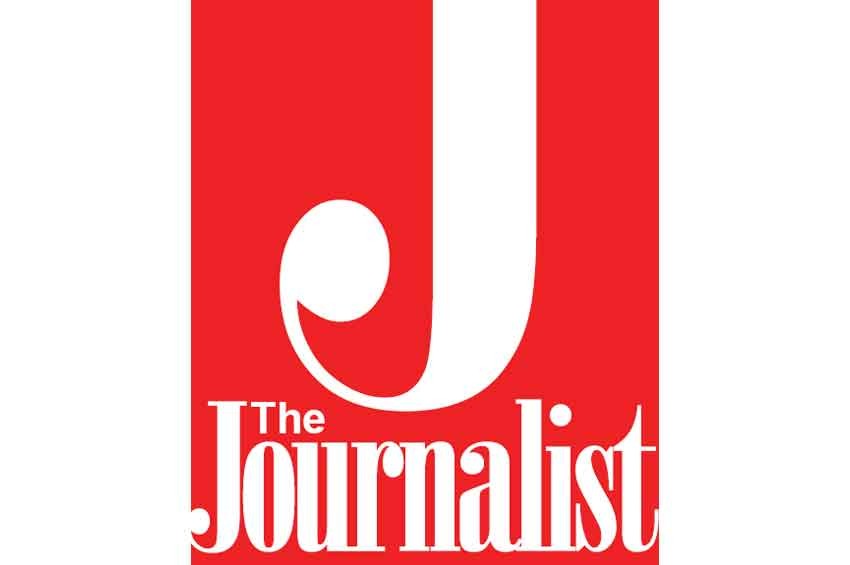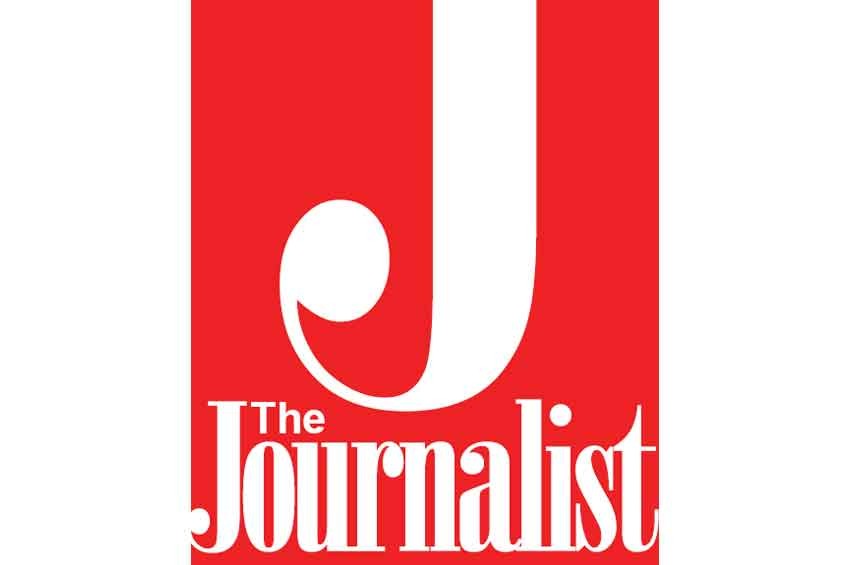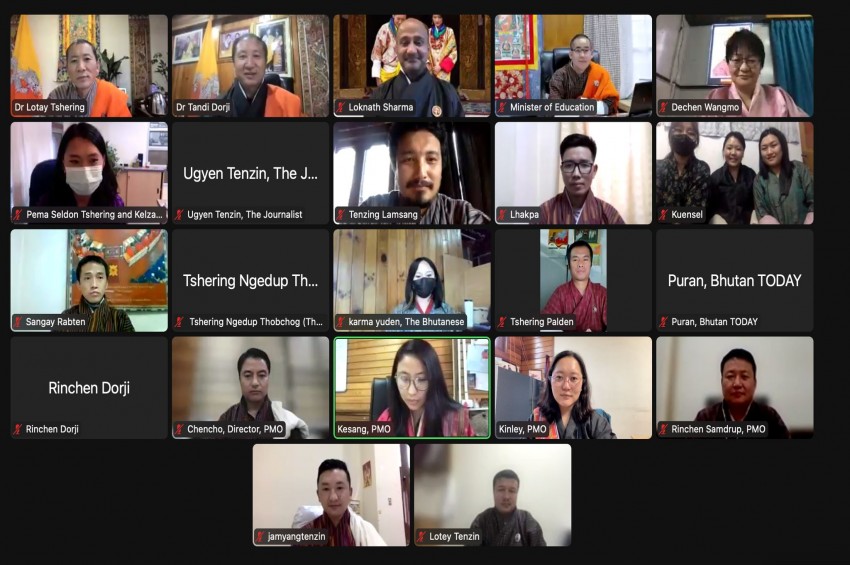In one year, the Bhutan Media Foundation (BMF) has trained 1,423 media professionals, 137 rural community members, 2,915 students, and 148 working professionals, including Members of Parliament. Grants were given to 60 reporters and freelancers and 4 private radio stations and 10 marketing managers and journalists sent to India and Thailand for internship. Scholarship was offered to two journalists. This has been disseminated in the BMF Annual Report 2021, launched earlier this week.
The report shows that trainings have been the major area BMF focused on. Broken down into activities, the report cites Activity 1 as Linking Climate Change Stories with Public Policy, where 18 grants were awarded. This included support to nine grantees who produced two climate change stories each, with the first story focused on the impact of climate change in rural communities and the second story reporting on the policy aspect of their first story.
Booklets of Climate Change Stories were published and the stories produced by the nine grantees were compiled into two booklets and published.
A workshop was conducted which engaged the grantees to introduce the subjects of their reporting and share their reporting experience with a select group of people, who broadened the discussion on the subjects. The objective of the workshop was to sustain public discourse broached by the grant stories and was conducted on August 2, 2021
The next activity concerns “Building Capacity of the Media Houses in Bhutan,” which saw 25 Journalists trained between 2-3 February 2021. In another training conducted on 8-9 February 2021, 24 reporters were trained and additional 20 trained in a training conducted on 15-16 February 2021
With the funding support, 12 media houses upgraded their websites with new features such as advertising spaces, contact information for paid subscription and videos on site, video content upload and social media integration.
On 17 March 2021, 39 stories written by three senior journalists, the book titled ‘Life and Living in Bhutan Amid Covid-19 Pandemic’ covering all aspects of life and living in Bhutan during the first year of the Covid-19 pandemic was published.
Building Youth’s Resilience to Infodemic, Misinformation, and Disinformation was another activity that involved launch of a Toolkit , titled ‘Navigating Infodemic, Misinformation, and Disinformation. It was launched on 17 November 2021 . The toolkit contains concise definitions and explanations of infodemic, misinformation and disinformation with relevant examples in the Bhutanese context. The toolkit was written and designed for the youth as they are the majority section of the population on the digital platforms and are most affected by false information
439 Students were also trained, that included students of Paro College of Education in Paro, Gedu College of Business Studies in Chukha, Dechentsemo Central School in Punakha, and College of Language and Culture Studies in Trongsa were trained on navigating infodemic, misinformation, and disinformation.
The next activities was about Responsible Use of Social Media in Bhutan. Two separate advanced SML training were conducted for the civil servants and employees of corporations and state-owned enterprises. In total 57 were trained.
The students of Norbuling Rigtar College in Paro, Jakar Higher Secondary School in Bumthang, Mongar Higher Secondary School in Mongar, Sherubtse College in Tashigang, Kunzangling Central School in Trashi Yangtse, Gyalpozhing College if Information and Technology in Mongar received a two-day Intermediate Social Media Literacy training. 1122 were trained.
Bhutan Media Foundation was established through a Royal Charter issued by His Majesty The King on 21 February 2010 to foster the growth of a strong, responsible media capable of playing an important role in the social, economic and political growth of the nation. It is mandated to support wholesome development of media so that it can carry out its roles and responsibilities in the interest of democracy. Accordingly, a team of media professionals formulated a charter for BMF by distilling the wisdom of His Majesty’s Royal Charter. The charter of BMF was prepared to ensure that BMF operates professionally and serves its purpose fully. BMF was registered as a public-benefit civil society organisation on 10 April 2015. A four-member Board of Directors guides the functions and operations of BMF. The Board members comprise the representatives of His Majesty The King, the Royal Government of Bhutan, and the media industry.
The Mission of BMF is to sustain democracy by developing the Bhutanese media through transformational initiatives that promote quality journalism, advance media innovation, engage communities and foster freedom of expression, information and press. The vision is to take effective action targeted at informed society by fostering the growth of free, independent, responsive and credible media that play a constructive role in the social, economic, and political life of the nation, thereby leading to a vibrant democracy.
The report shows that trainings have been the major area BMF focused on. Broken down into activities, the report cites Activity 1 as Linking Climate Change Stories with Public Policy, where 18 grants were awarded. This included support to nine grantees who produced two climate change stories each, with the first story focused on the impact of climate change in rural communities and the second story reporting on the policy aspect of their first story.
Booklets of Climate Change Stories were published and the stories produced by the nine grantees were compiled into two booklets and published.
A workshop was conducted which engaged the grantees to introduce the subjects of their reporting and share their reporting experience with a select group of people, who broadened the discussion on the subjects. The objective of the workshop was to sustain public discourse broached by the grant stories and was conducted on August 2, 2021
The next activity concerns “Building Capacity of the Media Houses in Bhutan,” which saw 25 Journalists trained between 2-3 February 2021. In another training conducted on 8-9 February 2021, 24 reporters were trained and additional 20 trained in a training conducted on 15-16 February 2021
With the funding support, 12 media houses upgraded their websites with new features such as advertising spaces, contact information for paid subscription and videos on site, video content upload and social media integration.
On 17 March 2021, 39 stories written by three senior journalists, the book titled ‘Life and Living in Bhutan Amid Covid-19 Pandemic’ covering all aspects of life and living in Bhutan during the first year of the Covid-19 pandemic was published.
Building Youth’s Resilience to Infodemic, Misinformation, and Disinformation was another activity that involved launch of a Toolkit , titled ‘Navigating Infodemic, Misinformation, and Disinformation. It was launched on 17 November 2021 . The toolkit contains concise definitions and explanations of infodemic, misinformation and disinformation with relevant examples in the Bhutanese context. The toolkit was written and designed for the youth as they are the majority section of the population on the digital platforms and are most affected by false information
439 Students were also trained, that included students of Paro College of Education in Paro, Gedu College of Business Studies in Chukha, Dechentsemo Central School in Punakha, and College of Language and Culture Studies in Trongsa were trained on navigating infodemic, misinformation, and disinformation.
The next activities was about Responsible Use of Social Media in Bhutan. Two separate advanced SML training were conducted for the civil servants and employees of corporations and state-owned enterprises. In total 57 were trained.
The students of Norbuling Rigtar College in Paro, Jakar Higher Secondary School in Bumthang, Mongar Higher Secondary School in Mongar, Sherubtse College in Tashigang, Kunzangling Central School in Trashi Yangtse, Gyalpozhing College if Information and Technology in Mongar received a two-day Intermediate Social Media Literacy training. 1122 were trained.
Bhutan Media Foundation was established through a Royal Charter issued by His Majesty The King on 21 February 2010 to foster the growth of a strong, responsible media capable of playing an important role in the social, economic and political growth of the nation. It is mandated to support wholesome development of media so that it can carry out its roles and responsibilities in the interest of democracy. Accordingly, a team of media professionals formulated a charter for BMF by distilling the wisdom of His Majesty’s Royal Charter. The charter of BMF was prepared to ensure that BMF operates professionally and serves its purpose fully. BMF was registered as a public-benefit civil society organisation on 10 April 2015. A four-member Board of Directors guides the functions and operations of BMF. The Board members comprise the representatives of His Majesty The King, the Royal Government of Bhutan, and the media industry.
The Mission of BMF is to sustain democracy by developing the Bhutanese media through transformational initiatives that promote quality journalism, advance media innovation, engage communities and foster freedom of expression, information and press. The vision is to take effective action targeted at informed society by fostering the growth of free, independent, responsive and credible media that play a constructive role in the social, economic, and political life of the nation, thereby leading to a vibrant democracy.











